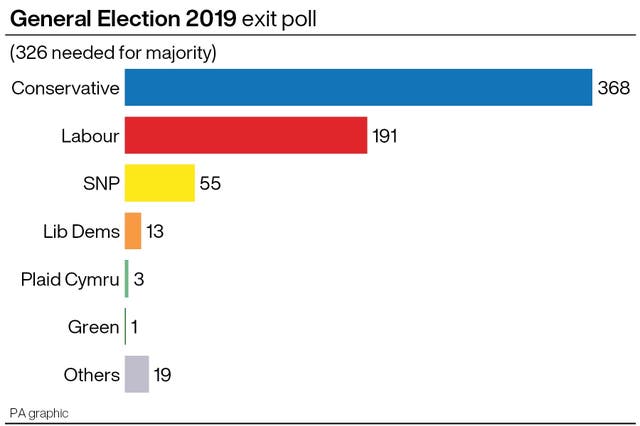
Jeremy Corbyn was coming under fierce criticism as Labour faced a crushing defeat in the 2019 General Election.
The official party line was to blame Brexit for dominating the discourse, but angry candidates queued up to claim that was ‘delusional’ and that the Labour leader was the greater problem on the doorstep.
Tensions within the party swiftly resurfaced as seat after seat in Labour heartlands fell to the Tories, with an exit poll suggesting Boris Johnson could end up with a majority of 86.

With Labour’s worst result since 1935 forecast, the party’s so-called ‘red wall’ crumbled as:
– The Tories took Blyth Valley, a Labour seat since 1950.
– Shadow environment secretary Sue Hayman became the first senior figure to be deposed when she lost Workington to the Tories on a 10% swing.
– More Labour seats across the north of England, the Midlands and Wales followed suit, including Bishop Auckland, Wolverhampton North East, West Bromwich West, Stockton South, Darlington, Peterborough, Blackpool South, Wrexham and the Vale of Clwyd.
Shadow chancellor John McDonnell sought to blame a public discourse in which “Brexit has dominated” and defended the left-wing policies adopted by him and Mr Corbyn.
But Mr Corbyn, who is expected to address his own future when the result in his Islington North seat is declared, will face overwhelming pressure to resign having suffered his second general election defeat in a row.
Ian Murray, who previously served as shadow Scotland secretary under Mr Corbyn and is trying to retain Edinburgh South, rejected the official narrative.
“Every door I knocked on, and my team and I spoke to 11,000 people, mentioned Corbyn,” he said.
For @UKLabour leadership to blame Brexit for the result is mendacious nonsense. Jeremy Corbyn’s leadership was a bigger problem. To say otherwise is delusional. The Party’s leadership went down like a lead balloon on the doorstep. Labour’s leadership needs to take responsibility.
— Vote Phil Wilson for Sedgefield Dec 2019 (@VotePhilWilson) December 12, 2019
“Not Brexit but Corbyn. I’ve been saying this for years. The outcome is that we’ve let the country down and we must change course and fast.”
Labour’s Gareth Snell announced his own defeat ahead of the result in the Brexit-backing former stronghold of Stoke-on-Trent Central and called for the resignation of Mr Corbyn.
Ruth Smeeth said she had also lost her seat in neighbouring Stoke-on-Trent North.
“I have lost, I am no longer MP – this is a disaster. Jeremy Corbyn should resign now before his own count is in.”
Phil Wilson, who faced a struggle to retain Tony Blair’s former seat of Sedgefield, was highly critical of the Brexit defence.
“For @UKLabour leadership to blame Brexit for the result is mendacious nonsense. Jeremy Corbyn’s leadership was a bigger problem. To say otherwise is delusional,” he tweeted.
“The party’s leadership went down like a lead balloon on the doorstep. Labour’s leadership needs to take responsibility.”
Ahead of the election, Labour sources had been predicting that Mr Corbyn would stay on as interim leader into the new year as a leadership battle is fought if the Tories won a majority.
Mr McDonnell told the BBC he was shocked by the exit poll, having thought the polls were narrowing in what he described as a “Brexit election”.
Deliberately misreading the exit poll from McDonnell. If this bears out, this is the utter failure of Corbyn & Corbynism. There is no other way of looking at it.
— Margaret Hodge (@margarethodge) December 12, 2019
“If it is anywhere near this it will be extremely disappointing for the party overall and for our movement,” he said.
“I think Brexit has dominated, it has dominated everything by the looks of it.”
On his and Mr Corbyn’s future, he cautioned that the actual results needed to be seen but said: “The appropriate decisions will be made and we’ll always make the decisions in the best interests of our party.”
But Labour’s Dagenham East candidate Margaret Hodge, a vocal critic of Mr Corbyn over his handling of anti-Semitism in the party, said the poll suggested an “utter failure” of “Corbynism”.
We’re going to hear the Corbynistas blame it on Brexit and the Labour Uber Remainers blaming Corbyn. Both are to blame for what looks like a terrible night for Labour. Both have taken for granted Labour’s heartlands. Sorry we couldn’t offer you a Labour Party you could trust.
— Caroline Flint (@CarolineFlintMP) December 12, 2019
Tom Watson, who resigned as Labour’s deputy leader, said a “root and branch analysis” was required to understand the defeat.
Caroline Flint, a Labour former Europe minister standing in the Leave-backing Don Valley constituency, blamed multiple wings of the party.
“We’re going to hear the Corbynistas blame it on Brexit and the Labour Uber Remainers blaming Corbyn,” she said.
“Both are to blame for what looks like a terrible night for Labour.
“Both have taken for granted Labour’s heartlands.”


Comments: Our rules
We want our comments to be a lively and valuable part of our community - a place where readers can debate and engage with the most important local issues. The ability to comment on our stories is a privilege, not a right, however, and that privilege may be withdrawn if it is abused or misused.
Please report any comments that break our rules.
Read the rules here